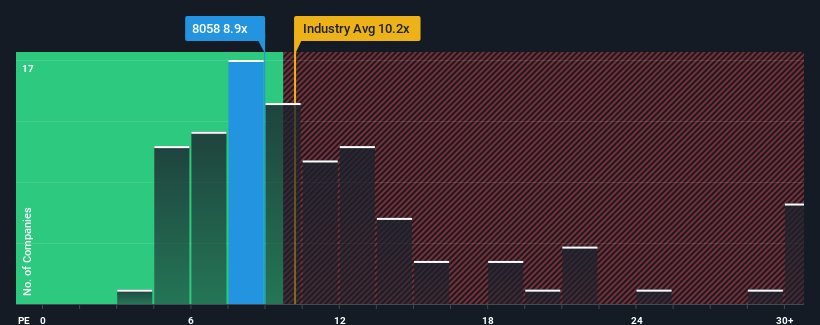- Japan
- /
- Trade Distributors
- /
- TSE:8058
Investors Aren't Buying Mitsubishi Corporation's (TSE:8058) Earnings

Mitsubishi Corporation's (TSE:8058) price-to-earnings (or "P/E") ratio of 8.9x might make it look like a buy right now compared to the market in Japan, where around half of the companies have P/E ratios above 14x and even P/E's above 22x are quite common. However, the P/E might be low for a reason and it requires further investigation to determine if it's justified.
With earnings growth that's superior to most other companies of late, Mitsubishi has been doing relatively well. One possibility is that the P/E is low because investors think this strong earnings performance might be less impressive moving forward. If not, then existing shareholders have reason to be quite optimistic about the future direction of the share price.
See our latest analysis for Mitsubishi

Is There Any Growth For Mitsubishi?
There's an inherent assumption that a company should underperform the market for P/E ratios like Mitsubishi's to be considered reasonable.
Retrospectively, the last year delivered an exceptional 26% gain to the company's bottom line. The latest three year period has also seen an excellent 179% overall rise in EPS, aided by its short-term performance. So we can start by confirming that the company has done a great job of growing earnings over that time.
Turning to the outlook, the next three years should bring diminished returns, with earnings decreasing 3.9% each year as estimated by the ten analysts watching the company. Meanwhile, the broader market is forecast to expand by 10% per annum, which paints a poor picture.
In light of this, it's understandable that Mitsubishi's P/E would sit below the majority of other companies. However, shrinking earnings are unlikely to lead to a stable P/E over the longer term. Even just maintaining these prices could be difficult to achieve as the weak outlook is weighing down the shares.
The Bottom Line On Mitsubishi's P/E
Typically, we'd caution against reading too much into price-to-earnings ratios when settling on investment decisions, though it can reveal plenty about what other market participants think about the company.
We've established that Mitsubishi maintains its low P/E on the weakness of its forecast for sliding earnings, as expected. Right now shareholders are accepting the low P/E as they concede future earnings probably won't provide any pleasant surprises. Unless these conditions improve, they will continue to form a barrier for the share price around these levels.
You need to take note of risks, for example - Mitsubishi has 3 warning signs (and 1 which can't be ignored) we think you should know about.
If P/E ratios interest you, you may wish to see this free collection of other companies with strong earnings growth and low P/E ratios.
New: Manage All Your Stock Portfolios in One Place
We've created the ultimate portfolio companion for stock investors, and it's free.
• Connect an unlimited number of Portfolios and see your total in one currency
• Be alerted to new Warning Signs or Risks via email or mobile
• Track the Fair Value of your stocks
Have feedback on this article? Concerned about the content? Get in touch with us directly. Alternatively, email editorial-team (at) simplywallst.com.
This article by Simply Wall St is general in nature. We provide commentary based on historical data and analyst forecasts only using an unbiased methodology and our articles are not intended to be financial advice. It does not constitute a recommendation to buy or sell any stock, and does not take account of your objectives, or your financial situation. We aim to bring you long-term focused analysis driven by fundamental data. Note that our analysis may not factor in the latest price-sensitive company announcements or qualitative material. Simply Wall St has no position in any stocks mentioned.
About TSE:8058
Mitsubishi
Engages in the natural gas, industrial materials and infrastructure, chemicals, mineral resources, automotive and mobility, food and consumer industry, power solution, and urban development businesses worldwide.
Flawless balance sheet average dividend payer.
Similar Companies
Market Insights
Community Narratives




